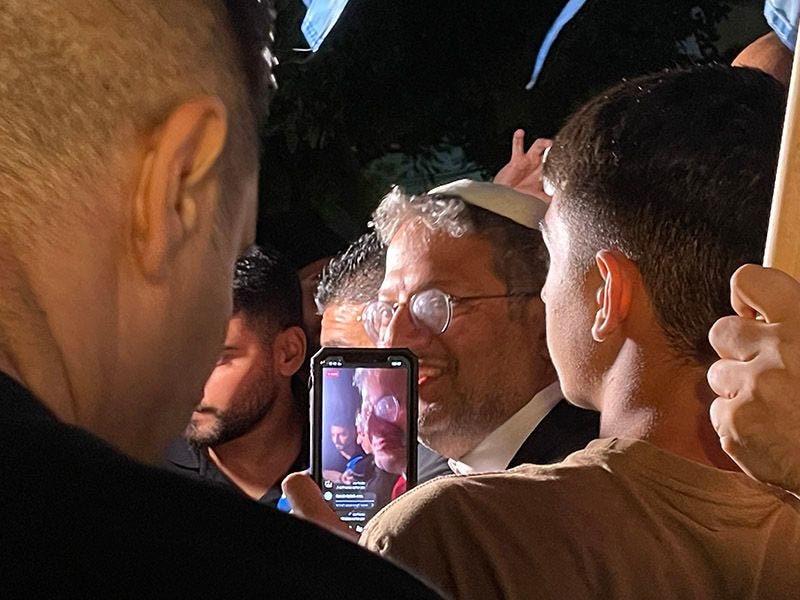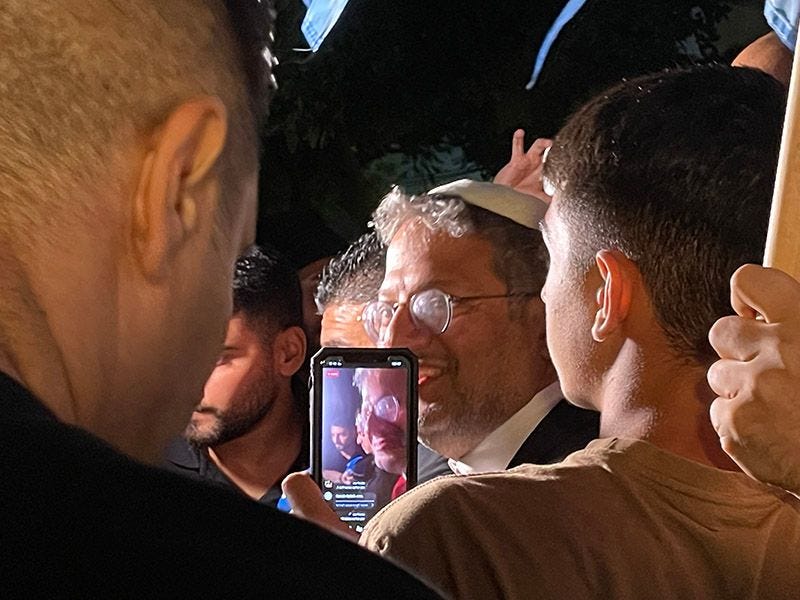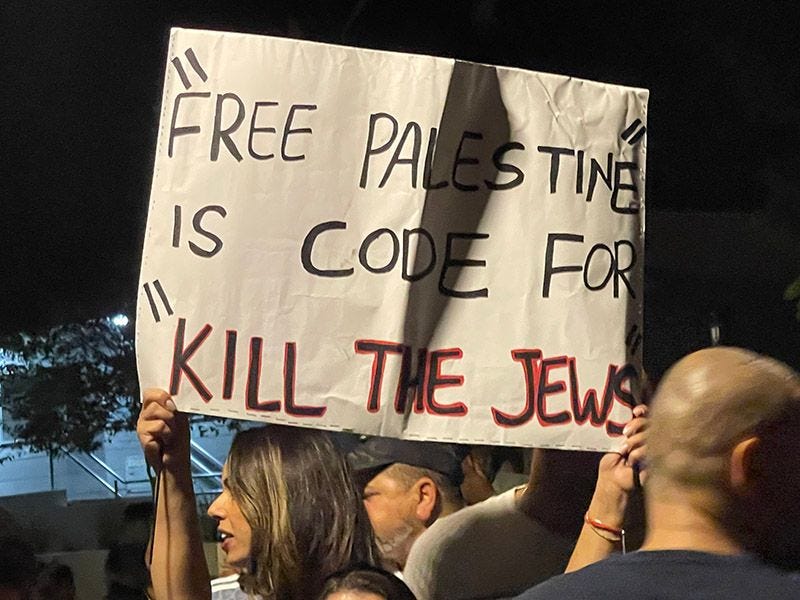Photo Essay: On the campaign trail with Itamar Ben Gvir
Far-right firebrand Itamar Ben Gvir hits the campaign trail in Tel Aviv. Vivian Bercovici was on hand to document the event in words and pictures.
I.
Battle lines were marked clearly.
On one side, behind flimsy police tape, were the “leftists.” On the other, the “right wingers.” Separating them was a two-meter-wide path patrolled by clusters of bored-looking police officers.
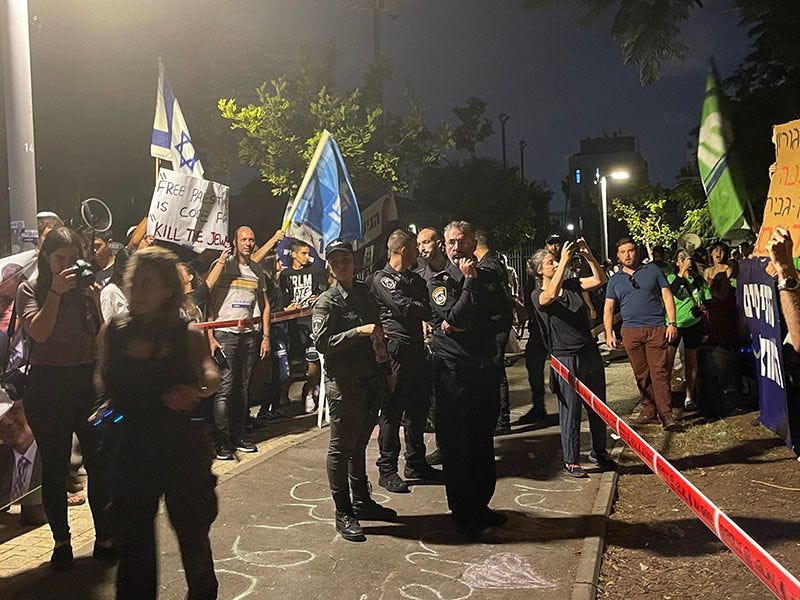
Until he arrived.
On Tuesday, Itamar Ben Gvir, leader of the Otzma Yehudit (Jewish Power) party, tweeted an invitation for all to join him on Wednesday evening at Shapira Park in south Tel Aviv.
The area has become a flashpoint for myriad racial and socioeconomic issues, creating the perfect milieu for Ben Gvir, a provocateur extraordinaire. Since the founding of the state, south Tel Aviv has been dominated by poorer Jews who are overwhelmingly of Sephardic and Middle Eastern origin. In the last 20 years or so significant numbers of Eritrean and Sudanese asylum seekers have settled in the neighborhood, causing periodic flare-ups of tension and, at times, violence.
Many Jewish residents are angry, saying that their neighborhoods have been overrun by a population that is mostly in Israel illegally. They point to higher crime rates, which is a fact, among other changes for the worse. As with any urban tension, it’s complicated.
The asylum seekers, typically referred to as a monolith, have children. They attend neighborhood schools, leading to clashes of culture, language, tolerance and more. And this is exactly why Itamar Ben Gvir chose this patch of Tel Aviv to make a much broader point.
Shapira Park, in the heart of south Tel Aviv, is in Ben Gvir’s world, “occupied” territory that he will reclaim for Israel.

II.
Itamar Ben Gvir is a disciple of the late Rabbi Meir Kahane, a right-wing demagogue. Until very recently, Ben Gvir hung a portrait of Baruch Goldstein – a 37-year-old Israeli American physician who murdered 29 Muslims and wounded 125 more during prayer in Hebron in 1994. The site is holy to Jews – who refer to it as the Tomb of the Patriarchs – and Muslims, who call it the Al-Ibrahimi Mosque. A fragile but workable peace is maintained at the site where strict segregation of prayer times is enforced and honored. Hebron has long been bristling with religious tension – for centuries – each side churning over its list of grievances.
The Goldstein murders were particularly gruesome. Rather than driving Jewish extremists underground, his violence seemed to embolden a hard core, among them Ben Gvir.
Recognizing that his open hero worship of Goldstein was a political liability, Ben Gvir reportedly removed the living room portrait in recent years and has undertaken a calculated program to present himself as a wiser, softened version of his younger self.
As always, he supports the annexation of all of Judea and Samara, the biblical names for the West Bank. For Election 5, he is running on a joint slate with the Religious Zionism party, led by Bezalel Smotrich. The two men are known to share an intense mutual dislike but were convinced to join forces by Netanyahu in order to maximize the efficiency of the right-wing vote.
And the master tactician – Bibi – was right. Together, Smotrich and Ben Gvir are enjoying a sustained mini-surge in pre-election polls and are a real force to be reckoned with; no longer the fringe “bit” players watching the action from the sidelines.
III.
There is no “occupation,” by Israel, Ben Gvir often says, and as his followers were yelling at Shapira Park on Wednesday night. “How can you occupy land that is yours?”

His political platform is based on the belief that God promised all of the land of ancient Israel to the Jewish people, which includes Judea and Samaria. Therefore, any suggestion that such land is “occupied” is misguided.
Instead, Ben Gvir flips the proposition and draws attention to what he considers to be “occupation” of Jewish land. Like the Shapira neighborhood in Tel Aviv.
On Thursday night, he continued his provocation tour with a visit to the hotly disputed Jerusalem neighborhood of Sheikh Jarrah. In the midst of a round of rock throwing between Palestinians and Jews, Ben Gvir brandished his pistol (not the first time he’s done so publicly), and taunted the police officers in attendance to shoot with live ammunition. The cops were restrained, clearly following orders to defuse and not incite further violence.
In response, Ben Gvir offered this comment on Twitter immediately after the clash:
“Tonight, in Shimon Hatzadik [Jewish name for the Sheikh Jarrah neighborhood] – Arab terrorists are throwing stones and endangering my life and the lives of the residents here and the police are afraid to shoot. This government ties the hands of the police and endangers them and the citizens of the country, and we are here to protect them.”
For Ben Gvir, that was a mighty effective whistle-stop. For Israel more broadly, perhaps not.
As do many Israelis, I have serious issues with the way in which the Occupation of the West Bank has developed and stagnated over the last 55 years. I am also of the view that Israeli oversight, occupation, whatever you want to call it – is neither illegal nor does it contravene the Geneva Convention (it’s baffling how when it comes to Israel having won defensive wars the global community forgets that basic and fundamental fact) – but those issues will be addressed on another occasion. I do, however, disagree vehemently with the religious chauvinism and what I see as the extremism of Ben Gvir. In his ideal version of the State of Israel, Jewish religious law – “halacha” – would be preferred over liberal democracy. And, even if his political vision is “right” – whether it is pragmatic and ethical is a whole other matter.
I often think that it is the Ben Gvirs of the world who found themselves atop Masada, fortified and holding out against the Roman Empire. The thousand or so people who took refuge on that inhospitable mountaintop plateau were the fundamentalist extremists of their time.
People like me? They dispersed and many assimilated.
To which Ben Gvir and his supporters would respond: “That’s exactly the point. We are the people who will ensure the survival of Judaism. Not you.”
IV.
As a journalist, I was free to wander at the park on Wednesday night. The leftist camp was very well-organized, loud and unrelentingly blasting their messages – that Ben Gvir is a racist and anti-democratic – from rotating megaphones.
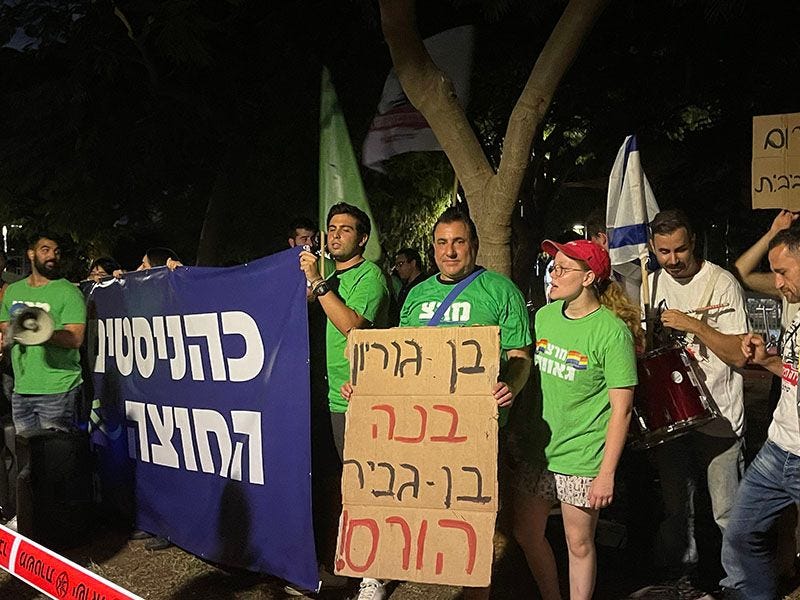
In fact, they totally owned the stage. Ben Gvir’s people seemed annoyed and were flagging. I walked into the small sukkah (a makeshift hut erected for eating meals during the festive holiday celebrating the harvest, Sukkot) they were using as their HQ for backpacks and spoke with a burly, and angry, organizer. “How’s it going?” I asked him, sensing his frustration.
“It’s a disaster,” he fumed. “They’ve taken over our event. We can’t even hear ourselves. They’re making so much noise.”
He was correct. They were getting trounced. Until the Man Himself arrived.
It was as if the center of gravity shifted suddenly. The cops snapped into formation and put on their “don’t mess with me” faces. They cordoned the length of the path, clearing it of any stray protesters.
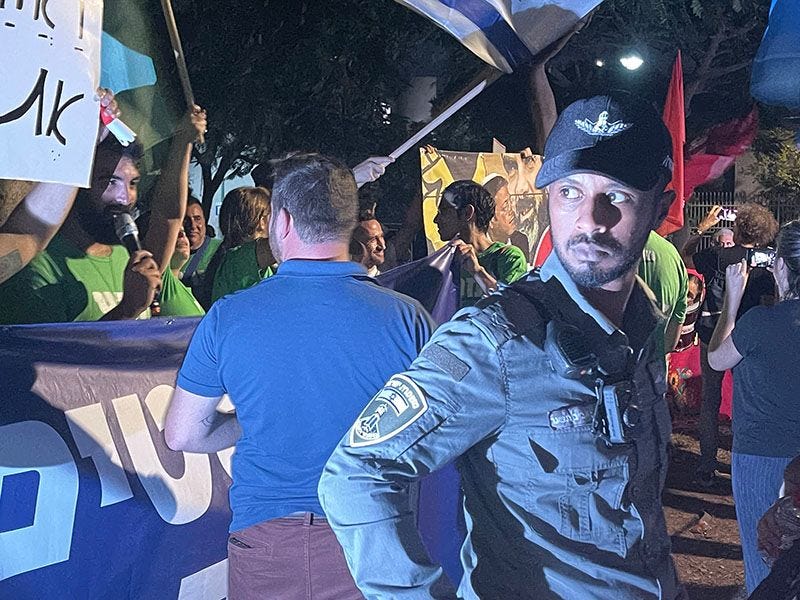
A mass of people moved towards the street, drawn to a cluster of lights. At the center of this slow-moving blob strode Itamar Ben Gvir. Triumphant. Coming to take back “occupied” south Tel Aviv.
I waited in the park, on the right-winger side by the sukkah, knowing that he would wend his way over, which he did. He paused for a few minutes near the sukkah entrance to speak to the media and his people. It was a typical Ben Gvir stump, encouraging his followers to maintain the faith and momentum, assuring them that change is coming, that this is “our” country and we will preserve our rights. Only if you were embedded deeply in the swarm, a meter or so from the man, would you hear anything.
But the actual words didn’t matter. It was all about buzz and energy. He thrives on conflict. The warring megaphone din continued as he spoke, with the right more energized by Ben Gvir’s presence.
He ducked into the sukkah, the tension eased a touch, and I decided I’d had enough.
Ten years ago, Ben Gvir was roundly regarded as an extremist in Israeli society and political life. Today, he seems to have slipped into the mainstream, courted aggressively by none other than Likud leader Benjamin Netanyahu.
So, the real question is, has Ben Gvir moderated his views, or has the Israeli public moved along the continuum to such a degree that he is a legitimate political option?
The answer, of course, will be provided by the electorate on November 1. But, if the polls are at all accurate then it would appear that the policies and worldview of Itamar Ben Gvir are, indeed, regarded by a growing number of Israelis as befitting a potential senior member of the government of Israel.
For many Israelis, that possibility is extremely sobering. In fact, this scenario was the focal point on Saturday evening of the most-watched political talk show in the country. One guest after another addressed the hard-right shift of the electorate and what it may foretell. As former PM, IDF Chief of Staff and Minister of Defense, Ehud Barak, summed up: “The alliance between Ben Gvir and Bibi is the biggest threat to the State of Israel.”
V.
Even though this monumental political conflict is framed in terms of “right” and “left” wing, the nomenclature is totally unsuitable. I have made this point previously and will harp on it unceasingly.
The so-called “right” is an alliance of pragmatic interests that has nothing to do with higher spiritual or religious or humanistic values. The ultra-Orthodox, religious Zionists and heavily secularist Likudniks have one thing in common: the drive to secure their power. That is where the common interest begins and ends.
Their political and day-to-day life values are entirely incompatible. But they have agreed to support one another. The bargain? The ultra-Orthodox receive funding for their educational institutions and will not be required to teach any “modern” subjects, like math, science, English. All Torah all the time. And, their automatic exemption from serving in the army or national service would be reinstated. In return they agree to stay out of other issues – like foreign policy, security and general economic matters. “Win-win” for them.
Religious Zionists? They receive government support and funding for the construction of new settlements and expansion of existing ones. Their hostility towards the judiciary and other state institutions, which they regard as having been overtaken by corrupt secular interests, aligns with Likud beliefs, so they support the cudgel-like proposals advocated by Likud to deal with those issues.
And Likud? They run the show. Once in power, they will certainly pass legislation to ensure that Bibi’s trial on multiple allegations of corruption is “suspended.” Forever.
They have pledged to reform the manner in which Supreme Court and other judges are nominated, vetted and appointed. They have similar beefs with judicial institutions and law enforcement generally. Many of the concerns regarding the “clubiness” of certain institutions are not only legitimate but should constantly be questioned and assessed in a well-functioning democracy. The difference here is that Likud has declared war. This is a very effective way to motivate grumbling voters who feel disenfranchised, but it does not bode well for the healthy functioning of society in the aftermath.
It is interesting that the buzz leading up to Election 5 – to be held on November 1 – is less about Bibi (as were the last 4) and more about the future of Israel. Bibi is seen more as the vehicle enabling the various religious-based factions to coalesce and forge a fake common interest, even by the nefarious and mendacious standards of any political system.
As in most western democracies, Israel is experiencing inflation, severe housing shortages and other social and economic challenges. According to some mainstream polls these are the top-of-mind concerns as the population mulls its vote.
I am no pollster but I believe there is a very strong undercurrent of concern for the future, beyond the price of tomatoes and cottage cheese, or the stratospheric real estate market. We are now down to the wire, two weeks from E-Day. The month-long holiday period ends on Tuesday and the country is laser-focused on the task at hand.
Based on what I’m hearing anecdotally, and reading in the Hebrew media, and hearing on Israeli television, I’d wager that most Israelis are thinking hard and almost exclusively about what life would be like should the ultra-Orthodox and Religious Zionists control the government with Netanyahu at the helm.
I personally know of several families who are in the process of moving abroad because they cannot abide the political direction of the country. These are not North Americans or other Diaspora Jews who are returning to their native countries. These are Israeli-born, salt-of-the-earth citizens whose parents and grandparents built the state. They are depleted and vehemently opposed to a country where the balance of power is firmly in the religious camp.
Living in Israel comes with many challenges. But how many people will choose to remain in a state where right-wing extremists control the government? Without moderation on the part of the ascendant right-wing and ultra-Orthodox bloc, the existing tensions will intensify. How Israel is defined in the future will turn in large part on the outcome of this election, or Election 6, or 7, or however many it takes until a governing coalition can be formed.
This election is about the foundational values of the State of Israel for the next century: Will the Jewish state incline to religious-based governance, or will it adhere to the liberal democratic vision of the founders?
This is the ballot question in Election 5.
At the moment, the electorate is cleaved pretty much right down the middle.
This article is for paid subscribers only. Thank you for being a Premium Member of State of Tel Aviv.



